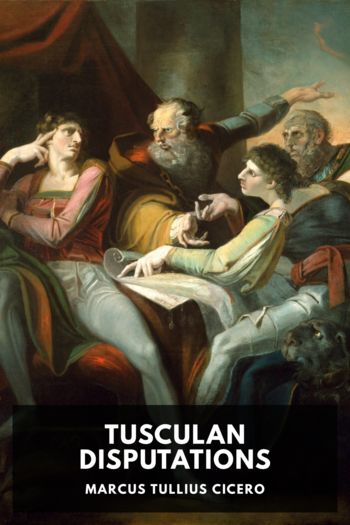Tusculan Disputations - Cicero (red novels TXT) 📗

- Author: Cicero
Book online «Tusculan Disputations - Cicero (red novels TXT) 📗». Author Cicero
As this is my opinion, I have explained it in these very words, in my book on Consolation.19 The origin of the soul of man is not to be found upon earth, for there is nothing in the soul of a mixed or concrete nature, or that has any appearance of being formed or made out of the earth; nothing even humid, or airy, or fiery. For what is there in natures of that kind which has the power of memory, understanding, or thought? which can recollect the past, foresee the future, and comprehend the present? for these capabilities are confined to divine beings; nor can we discover any source from which men could derive them, but from God. There is therefore a peculiar nature and power in the soul, distinct from those natures which are more known and familiar to us. Whatever, then, that is which thinks, and which has understanding, and volition, and a principle of life, is heavenly and divine, and on that account must necessarily be eternal. Nor can God himself, who is known to us, be conceived to be anything else except a soul free and unembarrassed, distinct from all mortal concretion, acquainted with everything, and giving motion to everything, and itself endued with perpetual motion.
Of this kind and nature is the intellect of man. Where, then, is this intellect seated, and of what character is it? where is your own, and what is its character? Are you able to tell? If I have not faculties for knowing all that I could desire to know, will you not even allow me to make use of those which I have? The soul has not sufficient capacity to comprehend itself. Yet the soul, like the eye, though it has no distinct view of itself, sees other things: it does not see (which is of least consequence) its own shape—perhaps not, though it possibly may; but we will pass that by—but it certainly sees that it has vigor, sagacity, memory, motion, and velocity; these are all great, divine, eternal properties. What its appearance is, or where it dwells, it is not necessary even to inquire. As when we behold, first of all, the beauty and brilliant appearance of the heavens; secondly, the vast velocity of its revolutions, beyond power of our imagination to conceive; then the vicissitudes of nights and days, the fourfold division of the seasons, so well adapted to the ripening of the fruits of the earth, and the temperature of our bodies: and after that we look up to the sun, the moderator and governor of all these things; and view the moon, by the increase and decrease of its light marking, as it were, and appointing our holy days; and see the five planets, borne on in the same circle divided into twelve parts, preserving the same course with the greatest regularity, but with utterly dissimilar motions among themselves; and the nightly appearance of the heaven, adorned on all sides with stars; then, the globe of the earth, raised above the sea, and placed in the centre of the universe, inhabited and cultivated in its two opposite extremities, one of which, the place of our habitation, is situated towards the north pole, under the seven stars:
Where the cold northern blasts, with horrid sound,
Harden to ice the snowy cover’d ground;
the other, towards the south pole, is unknown to us, but is called by the Greeks ἀντίχθονα: the other parts are uncultivated, because they are either frozen with cold, or burned up with heat; but where we dwell, it never fails, in its season,
To yield a placid sky, to bid the trees
Assume the lively verdure of their leaves:
The vine to bud, and, joyful, in its shoots,
Foretell the approaching vintage of its fruits:
The ripen’d corn to sing, while all around
Full riv’lets glide; and flowers deck the ground:
then the multitude of cattle, fit part





Comments (0)